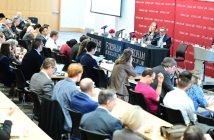The Feerick Center for Social Justice hosted a panel event, “The State of Asylum Processing & U.S. Immigration Policy: The Impact on Families,” on July 12 which discussed recent changes to asylum procedures and how they affect those seeking refuge in the United States.
“This program is being offered at an important juncture in U.S. asylum policy,” said Emerson Argueta ’18, who moderated the panel and who is a supervising attorney at the Central American Refugee Center. “After four years of unprecedented executive action… aimed at eroding humanitarian protections for asylum seekers,” many were anxiously awaiting a policy reversal, Argueta said.
However, he continued, many of the same policies have remained in place and recent changes have been met with skepticism from those working in the field. “We hope that today’s program will clarify where we’ve been, where we stand, and where we hope to go, in an effort to ensure that those who are fleeing persecution can continue to find refuge in America,” Argueta said.
Shalyn Fluharty, a consultant for the Feerick Center who has worked with Fordham Law students volunteering to assist with asylum applicants in Dilley, Texas, provided an overview of current asylum procedures, including a new rule aimed at reducing processing times. Fluharty directed the Proyecto Dilley (formerly known as the Dilley Pro Bono Project), through which the Feerick Center organized five annual service trips starting in March 2016 through January 2020.
“As a practitioner, I have found this moment in time to be incredibly confusing,” said Fluharty of the recent rule changes. “The million dollar question is whether or not … the rule further embraces our American values, our desire to welcome those who seek safety from persecution and torture, and to ensure that they have access to the rule of law in the United States as required by our international obligations.”
Asylum seekers have previously been processed in two main ways in the United States, Fluharty said: through “regular removal proceedings” under section 240 of the Immigration and Nationality Act, and “expedited removal” under section 235 of the same act.
Under regular removal proceedings, noncitizens appear in court before an immigration judge who decides whether they should be able to remain in the country or whether they should be deported. Under expedited removal proceedings, individuals are presented with an order of deportation and can be immediately deported by a Customs and Border Patrol agent without seeing a judge.
Those who are subject to expedited removal can normally transfer to regular removal proceedings if they state that they fear returning to their home country and pass a “credible fear interview.” However, the new rule would alter this process significantly.
Azadeh Erfani, a senior policy analyst at the National Immigrant Justice Center, spoke about the rule, which states that asylum applicants who pass their credible fear interview will then proceed to an “asylum merits interview,” where their claim will be decided, rather than going to immigration court.
“There are some serious concerns that this new process is ill-equipped to actually meet the promises of fairness that it puts forward,” said Erfani. “It puts asylum seekers on an incredibly fast track …. If they don’t have an attorney, it’s nearly impossible to envision that process to actually be fair for an asylum seeker.”
Other topics discussed during the panel event included Title 42 expulsions, the Migrant Protection Protocols (commonly known as the “Remain in Mexico” program) and dedicated dockets.
Maryann Tharappel, attorney-in-charge for immigrant and refugee services at Catholic Charities Community Services, discussed the dedicated docket expedited case processing at the immigration courts which was implemented in 2021, with the aim of resolving asylum cases for recently arrived families in select cities across the country within 300 days. So far, over 72,000 cases have been assigned to dedicated dockets, less than 15% of which are represented by counsel, Tharappel said.
To assist these unrepresented immigrants, Tharappel described Catholic Charities’ oversight and legal services delivery of the Immigration Court Helpdesk program in providing support for immigrants at New York City immigration courts, including group information sessions, application assistance, and preparing motions. The program relies on the assistance of attorney volunteers, said Tharappel, and she encouraged panel attendees to get involved locally with other organizations, to help meet the demand.
“If you have not represented someone seeking asylum in proceedings before, I strongly encourage you to take on a case under the mentorship of a trusted nonprofit immigration legal service provider,” Tharappel said. “We need more people doing this work.”




